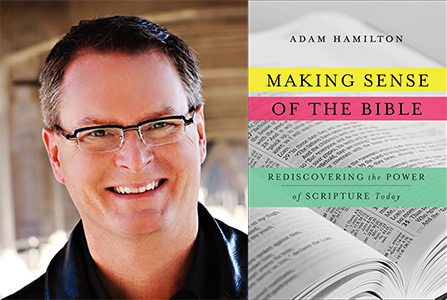By Rob Reardon, Major –
 The Bible is a wonderful and mysterious collection of books that chronicle the movement of God from the creation of the world through to return of Christ. Written in various literary styles by an eclectic selection of individuals, the Bible has been the source of inspiration and direction for millions of people throughout history.
The Bible is a wonderful and mysterious collection of books that chronicle the movement of God from the creation of the world through to return of Christ. Written in various literary styles by an eclectic selection of individuals, the Bible has been the source of inspiration and direction for millions of people throughout history.
Contained within the Bible, however, are some passages that are at first glance confusing and provide a certain level of consternation for the casual reader. It is because of this that Reverend Adam Hamilton decided to write his latest book, Making Sense of the Bible: Rediscovering the Power of Scripture Today. Hamilton is the founding pastor of the United Methodist Church of the Resurrection in Kansas City, Mo., and author of 19 books. In Making Sense of the Bible, Hamilton explores the many nuances of the Bible, including the parts that cause the most confusion and controversy.
Shane Claiborne, in his recommendation of this book writes that “Hamilton asks taboo questions and refuses cliché answers.” In 32 accessible chapters, Hamilton addresses issues and topics that many of us grapple with when reading the Bible. In his own words, Hamilton “envisions having a conversation with you, the reader, sitting on my back porch, each of us with a glass of iced tea.” Because of the conversational nature of this book, anyone can pick it up and find it to be a valuable resource in their quest to find God’s truth. If you’d like to go deeper, Hamilton also included a thorough bibliography that directs the reader to more scholarly texts and resources.
To launch this book, Hamilton embarked on a national speaking tour that provided him with the opportunity to introduce this book in a personal way. Utilizing a town hall meeting format, Hamilton traveled to several cities in the United States to meet with people who wanted to learn more about his new book. When he stopped in Washington D.C., I attended the event (watch it here) and found myself captivated by his friendly demeanor and presentation. It is evident that Hamilton is someone who loves Scripture. Quoting John Wesley, he told the audience that it is his desire to be homo unius libre, or a man of one book.
Hamilton attests to the Bible’s paramount role in his life, confessing that he regularly memorizes portions of Scripture and his days begin and end with reading God’s Word. Especially poignant is Hamilton’s personal view of Scripture: “When I open its pages, I hear God speaking to me. Its story, particularly the story of Jesus, is the one story that I hope will define my life. The Bible captures my deepest hopes and aspirations.”
It is obvious that the Bible holds a primary place in Hamilton’s ministry—for several years, he has encouraged his congregation to carry with them pocket testaments and challenges them to “be caught reading the Bible” and then to give it away to the person who noticed. To help facilitate this, the church provides these pocket testaments to its members.












